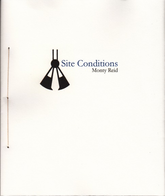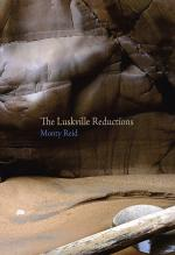 Monty Reid Photo by John W. MacDonald Monty Reid was born in Saskatchewan, lived for many years in Alberta, and moved to the Ottawa area in 1999, where he worked, until recently, as Director of Exhibitions at the Canadian Museum of Nature. Among his publications are The Life of Ryley (Thistledown), The Alternate Guide (rdc), Crawlspace (Anansi), Dog Sleeps (NeWest), and The Luskville Reductions (Brick). Chapbooks include Fridays (Sidereal), Six Songs for the Mammoth Steppe (aboveground), Sweetheart of Mine (BookThug) and the recent Site Conditions (Apt 9). Units from his 12-part Garden sequence have been published in Canada, Japan, France, England and the US. He has won numerous awards: 3-time winner of Alberta’s Stephansson Award for Poetry, a national magazine award, 3-time nominee for the Governor-General’s Award for Literature. His first Ottawa book, Disappointment Island (Chaudiere Books, 2006), was shortlisted for the City of Ottawa Book Award and won the city’s Lampman-Scott Award for poetry. He plays guitar and mandolin in the band Call Me Katie and continues to live in Ottawa. RUSTY TALK WITH MONTY REID Kathryn Mockler: How did you first come to writing poetry? Monty Reid: I first started writing poetry in Grade 10. We had been studying TS Eliot, but mostly I wanted to impress the girl who sat in front of me in English class. It didn't work, and I played hockey instead. It wasn't til half way through university that I realized the courses that really held my attention were literature and philosophy. So I dropped out of law and concentrated on English and soon started writing again. The literary community seemed to be exciting and open, some of my work was published in little magazines (Nodding Onion, White Pelican and others) and folks like Doug Barbour and Bert Almon were very supportive, so it was a positive experience early on and, by and large, it's remained that way. KM: What keeps you going as a poet? Or why do you write? MR: I write against loneliness. I mean that both on individual and social levels. There is so much in our society that works to fragment and isolate and dis-join people, whether it be at the level of personal relationships, or city planning, or global capital, that I think one of the great things writing can do is help build community. Plus, having written gives me a kind of quiet rush that I don't get anywhere else. I play in a band and the rush that musical performance provides is related and certainly more immediate, but it doesn't have the same level of complexity or the same patient development. I like them both, but the one that comes from writing has more endurance. KM: What is the revision process like for you? MR: The revision process is non-systematic for me. Just like I believe there is no one way to write a poem, there is no single way to revise. Different writers find different ways to do it. Some poems I have fiddled with for 30 years and still haven't published them. And there are some, not many, that I have deliberately not revised because I wanted them to be a record of immediate response. There are two things that are fairly typical for me though: once I put a manuscript together for a publisher, it gets a pretty thorough going over and two, I tend to work in sequences and I see every poem in the sequence as a revision, in some, often minor, way, of the poems that precede it. KM: How did you deal with rejection when you first started out? MR: I once tried to get into a fiction class at the University of Alberta, and the prof that ran it looked at my work and said, "...trying to teach you how to write would be like teaching a deaf man how to play the piano." So I wrote poetry. KM: How would you describe the writer/editor relationship? MR: It's a necessary one, if you intend to publish your work. If you're publishing, you obviously want others to read your work, and an editor is there to help that cause. In practice, it can be a fine experience or a frustrating one. In the end though, the writer needs to remain loyal to the work and not to the editor. KM: What authors or books would you recommend to new poets or writers? MR: Many, of course. And every writer needs different things at different times. For new poets, I think they need to start with their contemporaries because the language, the issues, the recognitions there will be most immediate and applicable, and the sense of possible community the strongest. Then find out where your contemporaries came from, and why. Without this, your work will become just a sampler of trends. KM: Is there an author that had a significant impact on your literary life? MR: As above, I've needed different things at different times. I've been influenced by writers as different as Robert Kroetsch and Elizabeth Bishop, bp Nichol, and Yehuda Amichai. But the guy I always return to is William Carlos Williams. I like that he didn't move. KM: A piece of literary advice for new poets? MR: Yes. Read outside your discipline. And I don't mean substitute Elizabethan poetry for the Romantics. Learn something about fluid dynamics or animal husbandry or onions. The world is not a text, and you shouldn't be either. KM: Your funniest literary moment, if you have one. MR: Helping rob mclennan move. He neglected to say he'd moved into the top floor of a three-storey walkup. And he has a lot of books. We almost died. KM: What you are working on now? MR: Always more than one thing at a time. I'm getting some Garden units ready for publication by Red Nettle Press in Edmonton and Corrupt Press in Paris. I'm working on a set of responses for a photography show that goes up at the Society of the Photographic Arts of Ottawa in November. I'm revising a set of translations called After El Gran Zoo. Another sequence called Air Miles is under way. And I'm always looking for gigs for the band.  MONTY REID'S MOST RECENT CHAPBOOK Site Conditions, Apt. 9 Press, 2011 Description from Apt. 9 Press: There is no more exciting poet working in extended serial forms in Canada today than Monty Reid. Site Conditions writes the process of construction, and the tools for construction, in a series of twenty brief and deceptively simple poems. Questions of intention, memory, safety and failure are interrogated; “You will have to go / the way you fear the most.”  MONTY REID'S MOST RECENT BOOK The Luskville Reductions, Brick Books, 2008 Description from Brick Books: Shortlisted for the 2009 Lampman-Scott Award (for the best book of poetry in the National Capital Region) A book of lyrics, fragmented, extended, and recovered, which read as a single long poem. The Luskville Reductions records a year in the life of a small Quebec town and the marriage that disintegrates there. While a book about loss, it is also a book about the state of becoming that coexists with change, the imbalance that for a time makes everything lucid, all the details adding up to much more than only an "us." The visible goes beyond mere facts in these poems, transformed into the deeply seen - and therefore sacred. |
Rusty Talk
Rusty Talk Editor: Archives
November 2017
Categories
All
|

 RSS Feed
RSS Feed
